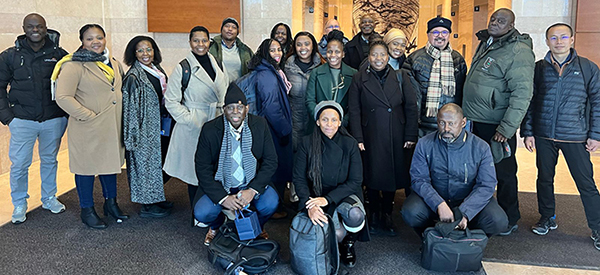Unisa’s Collaboration with Canadian Universities Gains Momentum
“What is particularly exciting to us is that these efforts have the support of the National Research Foundation, high-level diplomatic representatives in both Canada and South Africa, and, of course, Unisa’s top management,” he said.
Prof Puleng LenkaBula, Unisa Principal and Vice-Chancellor, set the process in motion in April 2023 after returning from an NRF-organised visit by principals and senior officials from South African universities and CEOs of state entities to various Canadian institutions.
Following the visit, which led to the establishment of the South Africa-Canada Universities Network (SACUN), of which Unisa is part, LenkaBula expressed particular interest in further exploring various partnership opportunities. These included potential partnerships for research infrastructure support; management, student and staff exchange; research with global impact; First Nations/indigenous knowledge systems; and innovation and startups.
Acting on this, Prof Thenjiwe Meyiwa, Vice-Principal for Research, Postgraduate Studies, Innovation and Commercialisation, led a task team whose work paved the way for the most recent visit to Canada, from 20 February to 2 March 2024.
The task team assembled a 19-person Unisa delegation, consisting of seven senior members of the College of Science, Engineering and Technology (CSET), seven from the College of Agriculture and Environmental Science (CAES), four from the Department of Research, Innovation and Commercialisation and one from the Directorate: International Relations and Partnerships.
Host universities are highly regarded for research and innovation
The five Canadian universities visited were the University of Alberta, Toronto Metropolitan University, University of Toronto, University of Guelph and McGill University. Members of the Unisa delegation also visited the MaRS Discovery District in Toronto, a public-private partnership that commercialises publicly funded medical research and other technologies.
Explaining why Unisa focused on these institutions, Ayanda Noma, Director: Innovation, Technology Transfer and Commercialisation, who was also part of the delegation, said: “These universities rank highly for their research and innovation strengths and are prolific in terms of their research and innovation productivity and impact.”
For example, the Toronto Metropolitan University’s startup incubator, DMZ, has successfully supported more than 800 startups, while the MaRS Discovery District has over 1 200 startups.
There are also strong synergies between a number of Unisa’s 10 Catalytic Niche Areas and the research and innovation strengths of some of the Canadian universities, ranging from energy, space studies, health studies and climate change to water research and the fourth industrial revolution, including artificial intelligence.
The importance of indigenous partnerships and cultural exchange was emphasised, with the University of Alberta, for instance, running initiatives to renew indigenous relations and conduct research in native studies. “Collaborative projects can explore indigenous knowledge systems, cultural preservation and community-based research to promote mutual understanding and respect,” says Unisa’s DITTC Director Ayanda Noma.
Also stressed was the importance of commercialising research and providing world-class experiential entrepreneurship training by supporting new “deep tech” ventures and students’ startups.
Making solid progress
Both Unisa and the Canadian universities are moving ahead to give substance to the recent engagements.
The DITTC is busy finalising memoranda of understanding (MoUs) on research and innovation collaboration matters with the University of Alberta and Toronto Metropolitan University (TMU), including a mentorship programme for Unisa-linked startups and student exchange to the TMU in October 2024.
In addition, MoUs on co-supervision of students and student exchanges are being concluded with the University of Guelph and TMU.
Both the South African High Commissioner in Ottawa and the trade and innovation attaché at the Canadian High Commission in South Africa are providing support for developing an MoU enabling broad research and innovation collaboration.
Meanwhile, Harry Bopape, Director of Research Support at Unisa, is in discussions with the University of Guelph and TMU on research management training, ethics and integrity and internationalisation.
In addition, CSET and CAES are looking into a range of possible collaborations in various fields, from food and nutrition to data science, energy and the environmental sciences.
Regular reporting and feedback on progress is an integral part of the collaboration-building process, according to Labuschagne. “The first meeting to assess progress will take place in June and every three months thereafter,” he cocluded.

